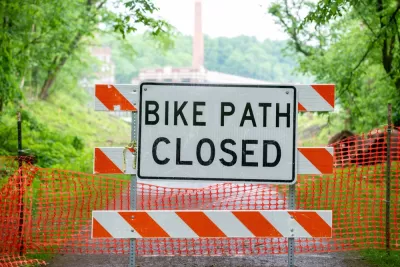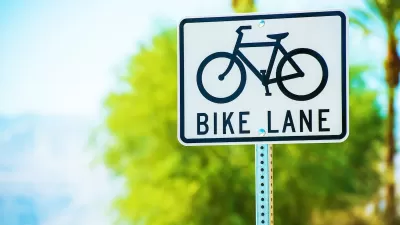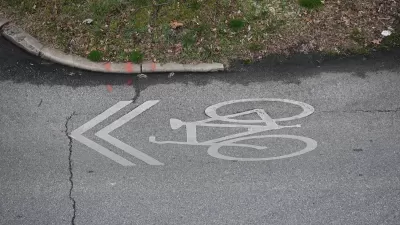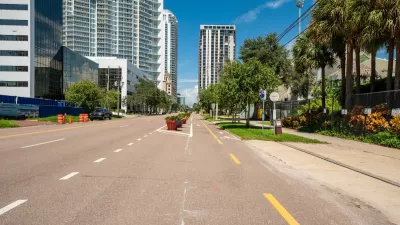After a recent death on the White Oak Trail, Houston bike advocates say closure markers on the city’s bike trails are often inconsistent and hard to see, posing a danger for cyclists at night.

Houston bike activists are calling on the city to improve safety on bike trails, particularly when it comes to marking trail closures and construction areas, after the death of a cyclist last week, reports Dug Begley in the Houston Chronicle. Matthew Ledvina died after being found sprawled in the middle of the White Oak Trail with his bicycle and orange construction netting nearby.
While the cause of Ledvina’s death is as yet unclear, other Houston cyclists say trail closures are often poorly marked and difficult to see at night. “Tuesday evening, five days after the crash, the netting had been adorned with strips of yellow caution tape and a homemade sign warning of the danger.” Local cyclists and walkers were observed ignoring the netting to avoid the detour.
Begley adds that “Wednesday, after cyclists raised concerns and the city and county were asked about the design of the closing, workers placed reflective warning barriers commonly used on streets along the trail as an extra measure where the path is blocked.”
Begley points out that there are no standardized regulations for closures or detours on bike and pedestrian trails, with only a brief mention of signage for bike trail closures in the city’s design manual. “‘There seems to be a complete dearth of regulations for signage, warnings and other laws,’ said Charlie Thomas, a Houston lawyer who often represents cyclists injured in crashes, as part of the national Bike Law Network.”
FULL STORY: White Oak Trail cycling death prompts questions on trail closings

Alabama: Trump Terminates Settlements for Black Communities Harmed By Raw Sewage
Trump deemed the landmark civil rights agreement “illegal DEI and environmental justice policy.”

Study: Maui’s Plan to Convert Vacation Rentals to Long-Term Housing Could Cause Nearly $1 Billion Economic Loss
The plan would reduce visitor accommodation by 25% resulting in 1,900 jobs lost.

Planetizen Federal Action Tracker
A weekly monitor of how Trump’s orders and actions are impacting planners and planning in America.

Waymo Gets Permission to Map SF’s Market Street
If allowed to operate on the traffic-restricted street, Waymo’s autonomous taxis would have a leg up over ride-hailing competitors — and counter the city’s efforts to grow bike and pedestrian on the thoroughfare.

Parklet Symposium Highlights the Success of Shared Spaces
Parklets got a boost during the Covid-19 pandemic, when the concept was translated to outdoor dining programs that offered restaurants a lifeline during the shutdown.

Federal Homelessness Agency Places Entire Staff on Leave
The U.S. Interagency Council on Homelessness is the only federal agency dedicated to preventing and ending homelessness.
Urban Design for Planners 1: Software Tools
This six-course series explores essential urban design concepts using open source software and equips planners with the tools they need to participate fully in the urban design process.
Planning for Universal Design
Learn the tools for implementing Universal Design in planning regulations.
Caltrans
Smith Gee Studio
Institute for Housing and Urban Development Studies (IHS)
City of Grandview
Harvard GSD Executive Education
Toledo-Lucas County Plan Commissions
Salt Lake City
NYU Wagner Graduate School of Public Service





























